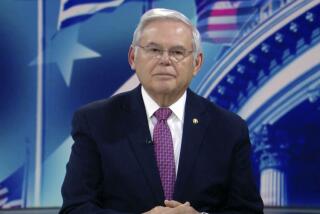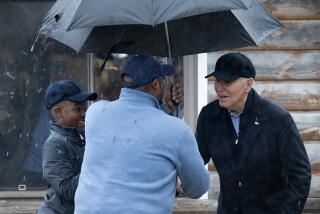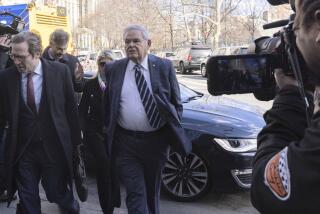New Jersey Gov. Chris Christie: ‘Mistakes were clearly made’
TRENTON, N.J. -- Admitting mistakes even as he laid out ambitious plans to improve schools and reform criminal justice, Gov. Chris Christie tried to restart his political agenda Tuesday in the middle of the swirling scandal over the George Washington Bridge.
The Republican governor opened his annual State of the State speech by repeating his apology for his aides’ role in ordering closed several access lanes leading to the bridge. The move last September snarled traffic for four days in Fort Lee, where the Democratic mayor had failed to endorse Christie’s November reelection.
“Mistakes were clearly made,” Christie said. “And as a result, we let down the people we’re entrusted to serve. I know our citizens deserve better. Much better.”
But Christie quickly moved on and didn’t return to the scandal again, instead focusing on promises to tackle tough issues such as pension reform and improving some of the state’s failing urban schools. A reputation for being willing to work across the aisle – along with a tough-talking style -- has helped define Christie’s national image, and he repeatedly ad-libbed “bipartisan” references in his 46-minute address to the New Jersey Legislature, where both houses are controlled by Democrats.
READ: Controversial Christie staffer emails
“We have succeeded in working together to be an example for the entire country, to spirited bipartisanship,” he said. “Let us not abandon that course.”
Tuesday’s was the first address since Christie’s reelection in November, when he cruised to victory over an underfunded Democratic challenger in this solidly blue state and immediately was proclaimed a leading Republican contender in the 2016 presidential race. But the huge margin over state Sen. Barbara Buono has been obscured by investigations into whether his senior staff went too far in the bridge scandal.
Democrats are creating a special committee to press the investigation and test Christie’s claims that he didn’t know until last week about the move to deliberately engineer the traffic jam. On his way to the podium, Christie stopped for a chat and a two-handed handshake with Assemblyman John Wiskniewski, who’s chairing the investigative committee.
Christie, who has repeatedly tangled with the state’s teachers union, devoted much of the speech to education, saying he would work for a bill to lengthen the school year and teachers’ workdays. “These children need more time in school -- some of them to catch up, some of them to excel more,” he said.
He said children in failing school districts including Camden’s - where he said only three students graduated college-ready last year – needed more “choice,” but he offered few details about what that meant. “This is a moral obligation,” he said.
Christie also touted efforts to treat drug offenders instead of jailing them and called for a new bail law that would make it easier to keep accused violent criminals in jail before trial.
Democrats said afterward they were still willing to work with Christie. But, with the questions about the bridge scandal hanging over the statehouse, some said the chance of sweeping actions this year were probably remote. Some said the scandal had shifted the balance of power.
PHOTOS: Scenes from “Bridgegate”
“I’m looking for cooperation, but not capitulation,” said Assemblywoman Bonnie Watson Coleman. “From my vantage point, it’s been a little too much capitulation.”
Christie’s call to rein in pension costs drew an immediate rebuke from Senate President Stephen Sweeney.
“He’s a conservative Republican,” Sweeney said. “We’re standing up for women and the working poor, and I don’t think that’s his group. So, no, I don’t expect anything to change.”
Heath Brown, an assistant political science professor at Seton Hall University, said the speech, with its focus on centrist reform measures, reminded him of President Clinton’s 1998 State of the Union address in the thick of the Monica Lewinsky scandal; Clinton also laid out a sweeping education agenda.
“Education is a popular policy position to take” for besieged politicians, Brown said. But he said he expected the investigation to consume the state until more answers came out.
“Ultimately, the harm is done to the state, if important issues of crime, education and taxes can not be addressed,” he said.
Twitter: @jtanfani
More to Read
Start your day right
Sign up for Essential California for news, features and recommendations from the L.A. Times and beyond in your inbox six days a week.
You may occasionally receive promotional content from the Los Angeles Times.







